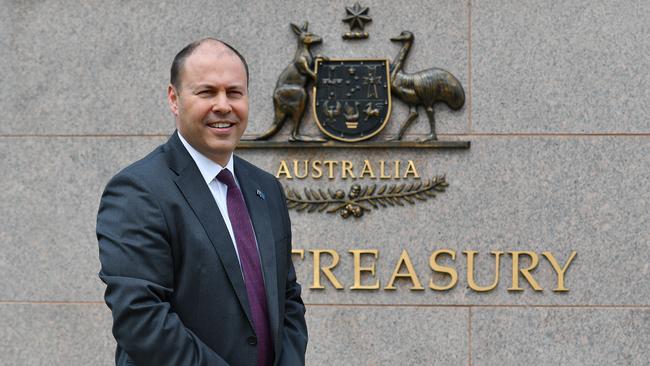
It will be a defining moment for Australia. It will be a budget previously unimaginable for a Liberal treasurer. It will be a Keynesian-style, big-spending interventionist budget that turns much of modern Liberal orthodoxy on its head.
But the Treasurer insists it is a budget born of necessity in response to extraordinary circumstances. Ideology has surrendered to pragmatism.
“The economic shock that Australia has faced during COVID-19 has been like no other,” Frydenberg said in an interview for this column.
“The global economic impact of COVID-19 is the greatest since the Great Depression. We have seen the equivalent of around 600 million people lose their job globally — and, of course, tragically more than a million lives have been lost.
“Australia has performed better than nearly any other developed economy in the world, both on the health front but also on the economic front.
“And our debt will rise both in net and gross terms, but still — as a proportion of GDP — it is a fraction of what we see in comparable nations like the UK, the US and Japan.”
Frydenberg recalled the advice of John Howard earlier in the year that in crises such as these there are “no ideological constraints”.
While recognising unexpected events often require an unexpected economic response, which meant that some traditional Liberal values must be jettisoned in the short-term, Frydenberg maintains his budget keeps faith with party tradition.
“This budget is true to the Coalition’s values — the power of aspiration, reward for effort — and you’ll see that on budget night with our changes to the tax system,” he said.
“Every waking minute has been devoted to ensuring we can get help to those who need it most, and one of the key Liberal Party philosophies is to provide a helping hand to those who need it – and you will see that in spades on budget night.”
The original 2020-21 budget was supposed to lock in long-term surpluses. Instead, this budget will be awash with red ink.
The deficit is expected to be more than $210bn. In the coming years, national debt is likely to exceed $1 trillion.
These horror numbers are lower than most advanced economies. But it means debt is baked into the budget for years to come. It is unlikely this government or the next will see it all paid off.
While the Treasurer confirmed the focus of the budget was “the here and now”, dealing with the immediate economic response and recovery from the pandemic, it will also be coupled with longer-term “structural reforms” as the recovery continues.
There will be a continuation of measures to help alleviate pressures on individuals, families and businesses, and initiatives to encourage spending. It is expected the already legislated personal income tax cuts will be brought forward. There will be new incentives for businesses to invest and employ, or re-employ, workers. And first-home buyers will also be beneficiaries.
The government has already announced several supply-side initiatives to expand apprenticeships and traineeships, boost energy supply by prioritising gas, drive manufacturing production, invest in infrastructure, help businesses benefit from the digital economy and improve the National Broadband Network. The primary focus, though, is employment.
“We are helping people who are out of work to get into work, and those who are in a job to stay in a job,” Frydenberg said. “The lesson of previous recessions is that it has taken a long time to get people back into work. It is said that unemployment goes up the elevators and comes down the stairs.
“If you look at the 1980s, unemployment took six years to get back below 6 per cent, where it started. And in the 1990s, it took 10 years to get back below 6 per cent from where it started.”
When Frydenberg stands at the dispatch box in the House of Representatives, he will deliver the most important speech of his political career. In recent months, he has worked in his Parliament House office or Canberra apartment away from his family on a diet of takeaway food. He laboured over the draft of the speech, which was revised again and again before being sent to the printer.
Frydenberg promises a speech “from the heart” that “reflects the challenges we face”, outlines “the economic recovery plan” and “focuses overwhelmingly on the task ahead — which is to create more jobs”. Whether it is the most important speech of his political career, he says, is for others to judge.
The budget will show the economic recovery is under way and will gather pace in the months ahead. But this is a budget for an economy in transition. The critical test for the government will be to deliver on its enormous promises to facilitate a shift from providing a safety net for individuals and businesses to supporting an economy to grow and become more productive and competitive.
Frydenberg is the most effective Treasurer since Peter Costello and Paul Keating. They too faced difficult economic times, although not on the same scale. The keys to their success were mastering economic details, projecting confidence and being powerful advocates. The ultimate test for Frydenberg, as it was for Costello and Keating, will be to successfully respond to the economic challenges on his watch.
Ten years ago, on October 25, 2010, Frydenberg made his first speech in the House of Representatives. He spoke in support of a “tolerant, fair and prosperous Australia” where “individuals, not governments, invent the future”. He encouraged politicians to “dream large” but warned about the need to “limit the government”, which was then already “too big”.
How times change.




On Tuesday night, Josh Frydenberg outlines the most significant budget since World War II.